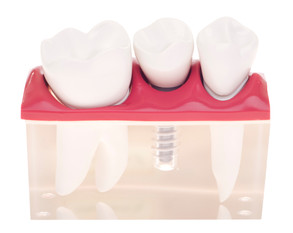
Welcome to M. Kramer Irby, DDS - Dentist for the Baton Rouge area.
T (225) 926-1059
Email: info@irbydental.com
M. Kramer Irby, DDS
642 Shadows Lane Baton Rouge, LA 70806
Dental Implants
Once the healing process is completed and the jawbone is attached to the implant, the patient returns to the dental office where the implant is fitted with the new tooth.
This process generally takes anywhere from three to eight months.
Dental implants are artificial tooth replacements that enabled dentists to replace missing or lost teeth. Today, implant techniques provide a wide range of tooth replacement solutions including:
- Single Tooth Replacement
- Multiple Tooth replacement
- Retaining Complete Dentures that need more stability
The root implant, by far the most popular, is the most effective because it mirrors the size and shape of a patient's natural tooth. This implant is often as strong as the patient's original tooth.
The implant or artificial root is placed into the jawbone under local anesthesia, then allowed to heal and integrate with the bone.

Although proper oral hygiene is always recommended for maintaining good dental health, it is especially important when a patient has received a dental implant.
Bacteria can attack sensitive areas in the mouth when teeth and gums are not properly cleaned, thus causing gums to swell and jaw bones to gradually recede. Recession of the jawbone will weaken implants and eventually make it necessary for the implant to be removed.
Patients are advised to visit their dentists at least twice a year to ensure the health of their teeth and implants. Dental implants can last for decades when given proper care.
